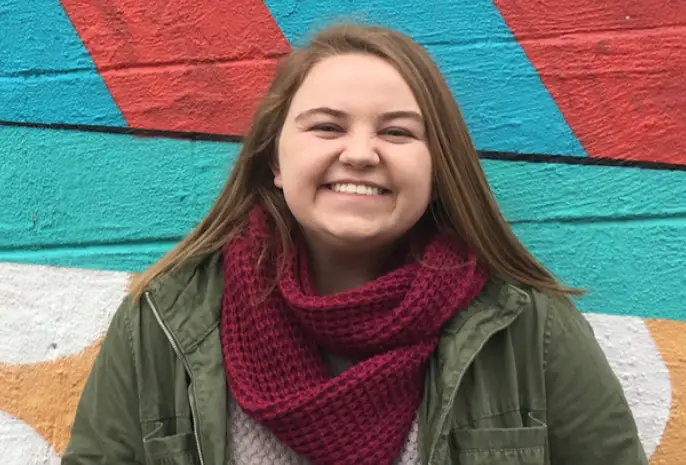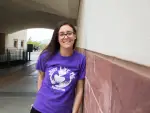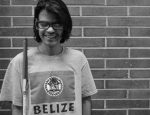While most students have been spending their free time binge-watching Netflix shows, Mackenzie Roux, a senior at Georgia College, has been busy running a nonprofit organization.
Roux, a devout Christian, is the founder of the “1:27 Project,” a nonprofit founded on the principles of the Bible verse James 1:27. The 1:27 Project seeks to restore love, hope, joy and God’s intended design for childhood. This upcoming summer, Roux and her team will work to fulfill the nonprofit’s mission by running a week-long camp for orphans in Romania.
Katie Lommen: What exactly is the 1:27 Project?
Mackenzie Roux: The 1:27 Project, which comes from James 1:27, says, “Religion that God our Father accepts as pure and faultless is this: to look after orphans and widows in their distress…” That part of the verse stuck out to me and resonated with me because it’s easy to make any excuse to not help “right now.”
We then try to justify that by telling ourselves someone somewhere who is less busy must be helping and once we have time we’ll help. The more and more you put it off, the less likely you are to do something.
I really think that verse exemplifies this notion, that you should look after orphans when they’re in distress in their current situation and not wait until they get adopted or until they get into foster care. So that’s our goal: to restore joy, hope, love, peace and the simplicity of childhood.
KL: Most college students are incredibly busy, so what prompted you to found the 1:27 Project?
MR: In 2014, I went to Romania on a spring break trip during my senior year of high school. I had grown up hearing the realities, the harsh realities of the Romanian orphanage system. My mom had been visiting since 2004 and it was a lot — the conditions were a lot more dire then.
They had taken videos so they could remember the trip and show it to the rest of us. Some of my earliest memories are seeing kids who look like they should’ve been about one year old and then my heart broke finding out that they were in the three to four year old range, which just meant that their growth had been stunted by an incredible amount.
It broke my heart when I was eight, it broke my heart when I was 18 and it still breaks my heart now that I’m 22. It’s not just something that you can unsee.

One of the many harsh realities for Romania specifically is that the children are not orphans — most of their parents are alive. They probably have brothers and sisters at home who will also end up in the orphanage or they will get to be the chosen ones who get to stay home and get to know their parents.
The parents may have kids and then get a divorce and put the kids in the orphanage. The crazy thing is, the parents will come and take the kids on a summer vacation and then put them right back in the orphanage.
KL: What gave you the passion to start this nonprofit right now, while you are finishing up your senior year of college? It’s probably the last thing a college senior would think to do.
MR: When I went back to Romania this past summer, I had this foolish idea and foolish confidence in myself that since I’d already seen the realities, it wasn’t going to break me this time. I was so wrong. It was a completely different experience. The darkness and the harshness of the orphanage was just outstanding.
So going back, my heart broke again and I was like, what do I do? My goal after college was to go to law school and do child advocacy law. I’ve taken the LSAT, I’ve studied, I’ve done the pre-law track, toured schools and met with professors.
I’ve done the whole nine yards and I was comfortable with that plan, but I’m not “made” to be comfortable. So I knew that I really needed to be pushed out of that if I really wanted to do what I intended to do.
The missionaries that we worked with in Romania this past summer asked me if I would be in charge of planning a camp for 2018. When I got home, I realized just how big of a financial commitment that was.
I was like, “How am I going to get these donations when I’m also doing class, I’m not home all the time and I don’t have anything that is regulating me in making sure that I am using their money in the way it is supposed to be used?” Every time I start thinking, “Why now, why now?”
At the very start of this, I thought that we’d do one camp, cross it off the list and then I’d proceed with my law school track. Like with many of my ideas of how my life should look, God revealed a very different and more fulfilling plan.
Lord willing, our long-term goal is to eventually spread globally — and this is Lord willing because He is already revealing to us that this is His vision. We have connections in Uganda, Greece, Costa Rica, Haiti, Mexico, Honduras, Dominican Republic, Ethiopia, Alaska — we’re worldwide. We are proclaiming Isaiah 6:8 and saying, “Here we are, send us!”
KL: What will the summer camp for the Romanian orphans look like?
MR: The missionaries in Romania are planning the camp and we will be funding it. There’ll be welcome signs, balloons and backpacks filled with stuff that shouldn’t be exciting things in our minds, but will be like actual gold to these kids. Hopefully, it makes them feel like kings and queens for a week.
We’re going to have a Bible study and I’m planning that, which I am excited about. We’re going to talk about the virtues of the Lord, to try to build that foundation so we can restore basic childhood faith for the kids. They’ll also learn about the heavenly Father, who unlike earthly fathers that abandon, deems them worthy and won’t abandon them.
We’ll do breakfast and maybe quiet time, and Bible study. We’re going to go to a ropes course adventure park, play games, do crafts and face paint.
KL: That sounds incredible. What has been the most rewarding part of running the 1:27 Project?
MR: Selfishly, it’s really rewarding to be able to have a group of strangers who I have never met in my life donate to this nonprofit — just knowing that a stranger can put their trust in me and my heart is so humbling and really cool.
The fact that God’s allowing me to be a representation of all His glory and perfection for these kids, that blows my mind.
Restoring not just their childhoods, but also their self-worth, showing that there are humans out there who aren’t like their parents, who will treat them right, but that there are also others out there who won’t. So showing them the difference can mean the difference between them overcoming or being overcome by abandonment.
KL: How can people support the 1:27 Project?
MR: There are a couple ways. Of course, with money; we have a PayPal account and a P.O. Box address for checks on our site. We’re also in charge of taking the backpacks for the children over, so that is a whole other sub-budget. We want it to be a bag with their name on it, we want for it to be thoughtful since they don’t have that — they don’t have anything with their name on it.
I want to give them that identity; it’s all about those little tiny details that make someone feel loved and cherished, and it’s all so worth it in the end. If people want to put money towards the backpacks, they can write their check specifically to that or put it in the details of the PayPal account.
And then, just prayers. Prayers for the workers that will be sent to work with us and for the orphanage. Pray for all the kids coming. Our missionaries said to already start praying for when the kids go back to the orphanage. Money is important, but prayers are priceless.












